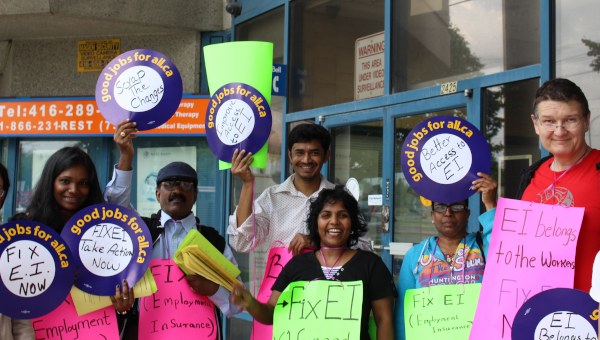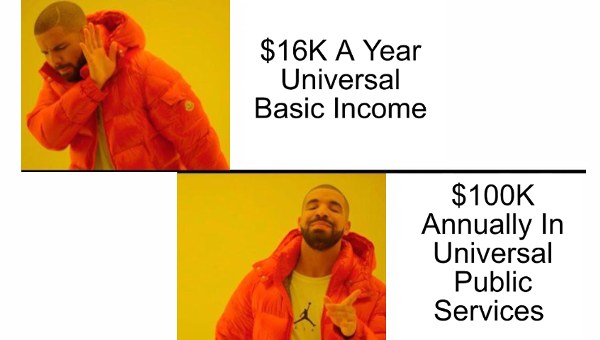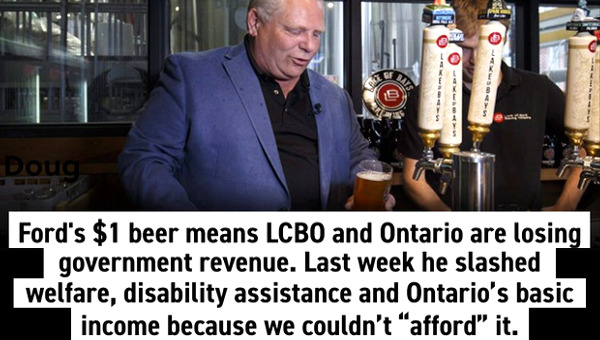Basic Income: Progressive Cloak and Neoliberal Dagger
For almost three decades, the Ontario Coalition Against Poverty (OCAP) has been fighting against neoliberal austerity, especially that aspect of it that has involved systematically degrading systems of income support. The underlying motive in this attack has been to render benefit provision as inadequate and precarious as possible so as to create the desperation that can drive people into the expanding low wage sector.
In this situation, the notion has taken hold that the solution is a clean start, with income support restructured along the lines of a system of basic income. Given our bitter experiences, we might have been expected to respond favourably to this development. However, as we looked at the idea of basic income, alarm bells began to ring. Two things, particularly, seemed ominous and concerning.
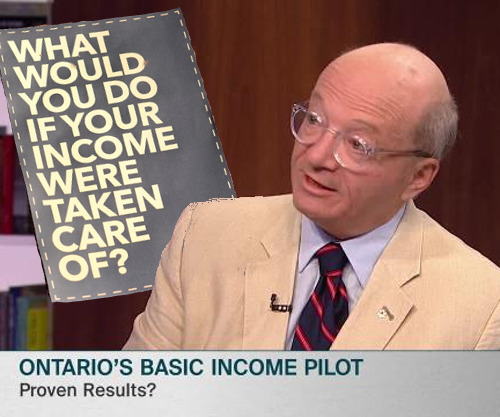
First of all, we were struck by how elastic the concept is. The political range of those who support basic income is quite remarkable. You can find horribly right wing proponents, such as the notorious U.S. political scientist, Charles Murray, and work your way across the political spectrum to the notion of a “capitalist road to communism” advanced by Robert van der Veen and Philippe Van Parijs. An ‘aspirational’ policy concept that changes shape according to the values and objectives of whoever is proposing it, seemed to offer scant protection in the context of the dominant neoliberal agenda.
Our second major concern emerged as we came to understand that a form of basic income could be implemented that would actually facilitate, rather than reverse or impede, the goals of increased exploitation and the expansion of low wage precarious work. As we looked at the pilot projects that had been put in place in Finland and here in Ontario, our conviction grew that basic income, progressive hopes to the contrary, is fundamentally a neoliberal trap.
The Context of UK Austerity
Since 2010, the attack on those who must rely on social benefits in the UK has been dreadful, even by the harsh standards of the international austerity agenda. A kind of a nightmarish opposite of the post war reform period has unfolded. The film I, Daniel Blake has driven home some of this brutality. The horrible social abandonment involved in the Work Capability Assessment (WCA), the benefit sanctions regime and, now, the rolling out of Universal Credit, can only produce in the UK a strong sense that anything must be better than the legislated poverty and rituals of degradation that present system entails. As understandable as such a conclusion is, however, I would still suggest that basic income is a gift horse whose mouth we should look into with some care.
The debate around basic income in the UK is of particular importance internationally. This is largely because of the progressive credibility that goes with the policy being given favourable consideration by the Corbyn led Labour Party. To this we must add support from the Scottish Government and pilot projects in Glasgow and Fife. What I would like to do here is to offer some general arguments about the regressive nature of any form of basic income that might actually come into existence and to bolster this with a look at the main features of the pilot project that is now unfolding in Ontario.
The Agenda of the Right
Income support systems have emerged in capitalist societies as reluctant concessions. The classic model is the English Poor Laws. As the peasants were driven from the land in the 1500s and a modern working class was being created, a dangerous and desperate surplus population also came into being. The landless, jobless and homeless posed a problem of public order for the Tudor authorities that proved too much even for their newly enhanced powers of state repression.
The Poor Laws that were adopted, were a calculated attempt to stave off unrest and social dislocation while allocating the minimum resources necessary for this so as to avoid the risk that unemployed people might find relief a better option than the worst forms of paid work. In 1834, this was taken further with the New Poor Laws and the concept of ‘less eligibility.’ Relief had to be lower than the lowest wages and provided under conditions that were as degrading as possible.
The systems of income support that emerged in the 20th Century, may have eased up on the horrors of the Victorian workhouse but they retained the fundamental features of less eligibility. Even during the years of the post war boom, in which major concessions were being made to unionized workers and the social infrastructure was being enhanced, the war on the poor by systems of public welfare was never called off. In the neoliberal decades since the 1970s, there has been a dramatic effort to render income support far less adequate and far more precarious than ever. The impact of this has been startlingly successful in terms of pushing down wages and supplying the needs of an expanding low wage sector.
Now, at this very point, the notion of basic income is placed on the table. At first glance, it appears strange that those who have gained so much from the degrading of existing income support systems would look with any interest at a replacement with progressive credentials. Indeed, there is no ruling class consensus on the matter. Donald Trump is focused on smashing any social provision Bill Clinton left intact and the UK Tories are quite happy to rely on the worst traditions of the Poor Laws. However, the more sophisticated players within the neoliberal order are giving serious thought to the advantages of a major tactical shift. In several important ways, basic income could work in their favour.
First of all, there is the not unimportant question of legitimacy. The rampant levels of inequality that have been generated during the neoliberal period are worrying the leaders of global capitalism. (More accurately, they are worried about the anger that is being created by this inequality). If right wing populism alarms them, we can be sure that radical movements on the left are even more of a concern. Even so unlikely an apostle of ‘enlightened capitalism’ as Theresa May has tried to counter the socialist threat of Jeremy Corbyn by contending that, “A free market economy, operating under the right rules and regulations, is the greatest agent of collective human progress ever created.”
Basic income fits nicely in the tool kit of an allegedly kinder and gentler capitalism. Some of the most rapacious exploiters on the planet, such as Elon Musk, Mark Zuckerberg and Richard Branson sing its praises. The concept of a secure basic income offers the fantasy of painless capitalism, even in the face of massive technological displacement.
One of the main selling points for basic income is the notion that it could be delivered with far fewer conditions attached to it than present systems. Very justifiably, the bureaucratic intrusion and moral policing built into them are widely regarded as oppressive and unacceptable.
I tend to think, however, that the further advance of the neoliberal agenda may well proceed more efficiently with less conditional forms of income support.
The Poor Law based model has been very successful in creating an ample supply of low paid workers with fewer rights and reduced bargaining power. However, it may be time to ease up on the use of that stick, not only because it is less necessary but because it can actually become counterproductive.
The climate of denial and inordinate readiness to cut off benefits within the present systems throws people into crisis and renders them destitute with great frequency. The elastic, on call workforce that people like Amazon’s Jeff Bezos are working towards might be easier to perfect with a less rule bound system that kept people more job ready.
Ontario’s Basic Income Experiment
A pilot project is now up and running in three areas of Ontario and the intention is to recruit 4,000 test subjects. It offers a veritable checklist for how a neoliberal version of basic income might be fashioned.
The Government promotional material says that it offers a “minimum income level.” In fact, this is set at about 75% of the Low Income Measure (LIM). While this is significantly more than the wretched pittance provided to people on social assistance in the province, it is certainly not an amount that would enable anyone to reject low wage employment or face the robot future with a smile.
Moreover, there is no reason to suppose that the levels of income provided under a relatively generous small scale test run would be maintained in any full scale programme. The pilot is not looking to test any universal system but is means tested. You must be poor to get on it and your additional earned income is clawed back.
A vitally telling element of the Ontario experiment is that it places great emphasis on drawing in people who work for poverty wages. Only 30% of those it wants to study will have been on social assistance. This reveals it as, primarily, a dry run for a wage top up system or, to put it another way, a subsidy to low wage employers. If employers in the low paying sector enjoy a set up under which their workers receive a significant portion of their income out of the general tax revenues, the pressure on them to increase wages is greatly reduced and governments can also avoid raising minimum wages. It is the 21st Century reincarnation of the Speenhamland system.
Right wing basic income proponents are always at pains to stress that the cash payment they wish to grant must not augment but, rather, replace existing systems of social provision, so that people become shoppers in the neoliberal marketplace, picking their way through the privatized rubble of the social infrastructure.
While operating on far too small a scale to take major steps in this direction, the Ontario pilot sends out some ominous signals of intent. Those test subjects who were previously on social assistance will lose many of the supports they previously had. Referral and counselling services are gone and people must ‘self navigate.’ Protection from court ordered debt payments is removed. Benefits for special dietary needs, payments for medical transportation, hearing aids, eyeglasses, service dogs and mobility devices are all eliminated.
In fact, even with the relatively more generous payments on the pilot, there is a whole population of disabled people with high support needs who would be worse off and would not wish to participate. When any evaluation process takes place after the conclusion of the test phase, we can only fear that they will be recklessly disregarded.
There is one other very important consideration when it comes to a regressive threat associated with basic income that I should note. In the context of an international refugee crisis and with the super-exploitation of migrant workers and ugly crackdowns on people without legal status, it is highly likely that any refashioned form of income support will be used as a means of racist exclusion from social protection. Yogi Acharya and AJ Withers from OCAP have written previously on how weak and sometimes overtly reactionary, the basic income lobby has been on these questions. The fact that, in the UK especially, basic income is frequently referred to as ‘citizen’s income’, is more than a little concerning.
Progressive Hopes
Before considering the question of a universal basic income (UBI) that would provide a truly adequate payment to all as a matter of right and without conditions, let’s note that many of those who advocate for basic income are ready to settle for something far short of UBI, often on the basis that it must be implemented in stages. This means that much of the progressive lobby is, in practice, prepared to accept a means tested payment to the poorest people that is, at the same time, a subsidy for low wage employers.
During last year’s race for the leadership of the federal New Democratic Party (Canada’s social democratic party), one contender, Guy Caron, came out for a form of basic income that would mainly use tax revenues to fill in the gap left by poverty wages. [Ed. also see LeftStreamed video “Basic Income: A Way Forward for the Left?”]
The NDP forms the Provincial Government in British Columbia at present and it holds power with the support of votes from the Green Party. It has declared that it will conduct some form of study of basic income. Very interestingly, a background paper to the Green’s last election platform offers the following comment. “There is a significant gap between minimum wage and liveable income. This approach is designed to protect marginal jobs. The long term intent is that the basic income program would fill the gap between minimum wage and a liveable wage.”
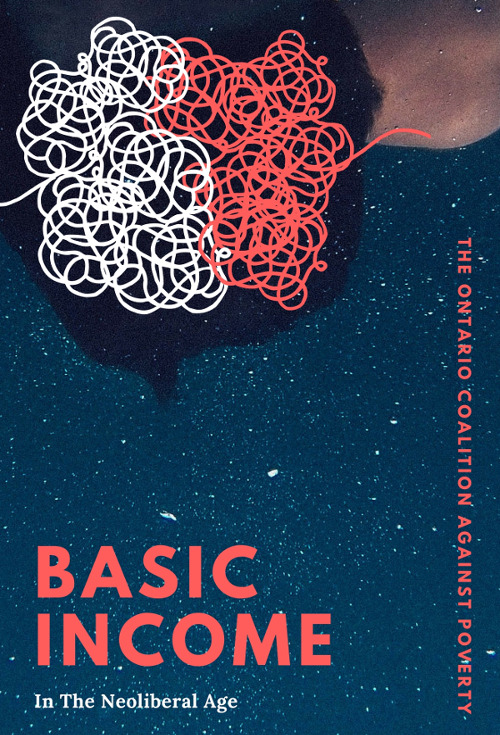
This tendency to settle for less and see regressive means tested wage subsidy systems as flawed but important first steps, is very common. However, it is generally argued that the eventual goal is to put in place a universal and unconditional system that provides a level of income that would enable someone to live reasonably well if they could not (or even didn’t wish to) participate in the job market.
Indeed, even in the face of massive displacement by technology, it is asserted that a UBI system would offer a viable way forward for society.
It is necessary to say very bluntly that the notion that the state is going to provide a level of secure and unconditional income that removes economic coercion from the dealings between employers and workers is just not rooted in reality.
After decades of neoliberal attack, our ability to win major social reforms has certainly been undermined but it goes beyond that. As Pam Frache has put it, “Simply put: no capitalist state will provide workers with the resources to go on indefinite strike.” If we were strong enough to win a concession from capitalism that removed from it the very capacity to exploit the working class, why would we settle for new social policy?
A Better Way Forward
If you believe that, somehow, a kind of post capitalist capitalism can be ushered into being in which everyone is topped up to income adequacy without conflict, then the harsh realities of the class struggle must seem very unappealing. However, if you’re prepared to accept that there is no social policy end run around neoliberal capitalism, then we have to act in line with that reality.
Even at its grandest and boldest, for all its radical pretensions, basic income seeks to make its peace with that neoliberal order and accept a commodified form of social provision. Armine Yalnizyan from the Canadian Centre for Policy Alternatives (CCPA) has written a piece revealingly subtitled, “Are we better off when we have more income, or need less of it?” that explores the benefits of struggling for public services that ‘buy more freedom from the market’ rather than focusing on the ‘income transfer.’ She points to the CCPA’s calculation that, in Canada, for an annual outlay of $15-billion, half the cost of an entry level basic income that would just lift the poor above the poverty line, it would be possible to “expand the stock of affordable housing, child care and public transit, as well as almost eliminate user costs for pharmacare, dental care and post-secondary schooling.”
John McDonnell has suggested that a Corbyn-led Labour Government might surpass the reform agenda of the Attlee Government of 1945. However, the welfare state that was developed at that time was about schools, hospitals, council housing and a complex and durable social infrastructure.
If we are to go on the offensive against the neoliberal agenda, surely it is the fight for free, expanded and accessible public services that should be our focus. If present systems of income support for unemployed, sick and disabled people are inadequate, we can demand full entitlement, adequate income and an end to intrusive rules and moral policing.
However, rather than hope for a tax funded payment to blunt the impact of low wage, precarious work, let’s step up the fight for decent wages. If technological displacement threatens us, let’s challenge it and demand reduced hours of work at no loss of pay. The gains of workers in Germany around a 28 hour work week are of far greater value than a promise of basic income from Silicon Valley.
If we are to drive back the attacks we face under capitalism and, indeed, to challenge that system itself and take our struggles in the direction of social transformation, it will be done through social mobilization and political struggle. Basic income is a futile hope for a way out that is, in reality, blocked. At the same time, a neoliberal version is in the works that is all too real and likely. It would be the most tragic miscalculation to lay down a progressive welcome mat for it. •
This article first published on the counterfire.org website.
For more information on this topic, see Basic Income In The Neoliberal Age.


